Module 9 Friendship>Unit 1 Could I ask if you've mentioned this to her?课件 (共92张PPT)
文档属性
| 名称 | Module 9 Friendship>Unit 1 Could I ask if you've mentioned this to her?课件 (共92张PPT) | 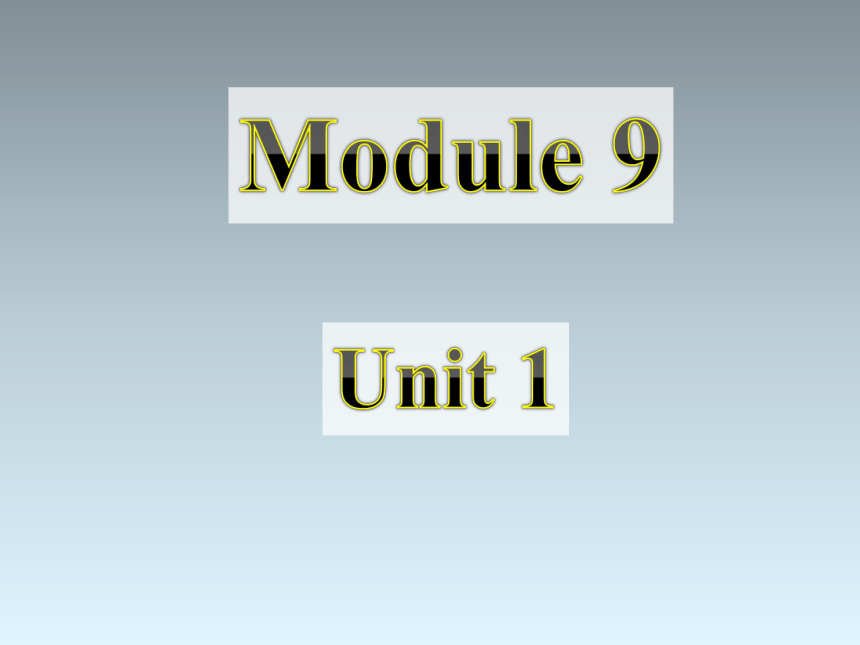 | |
| 格式 | ppt | ||
| 文件大小 | 3.8MB | ||
| 资源类型 | 教案 | ||
| 版本资源 | 外研版 | ||
| 科目 | 英语 | ||
| 更新时间 | 2022-07-20 17:44:59 | ||
图片预览

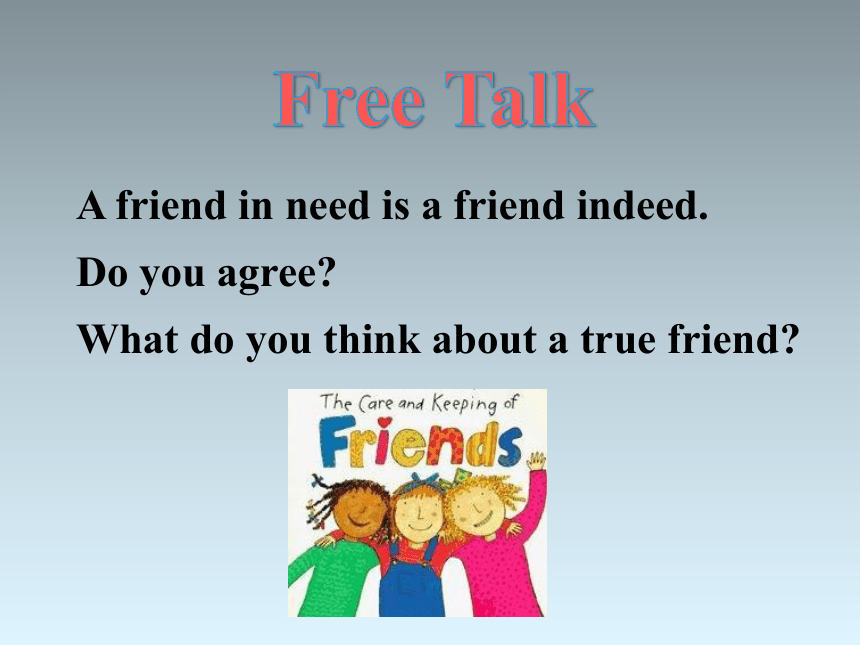
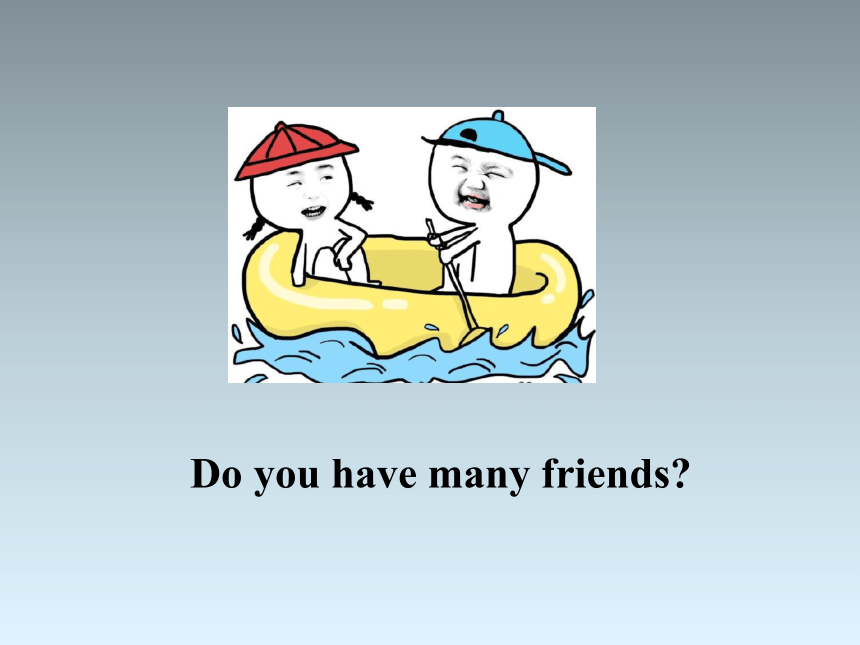


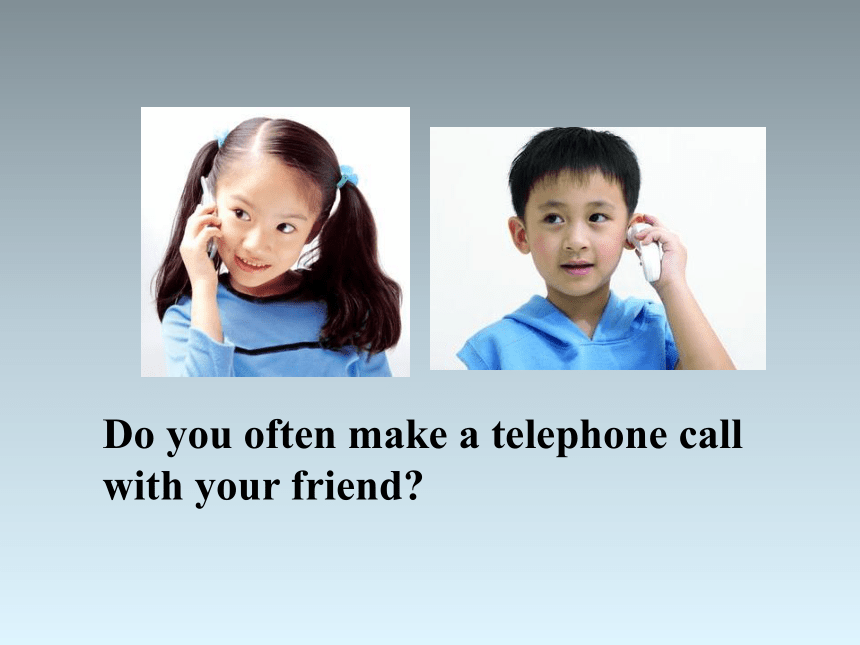


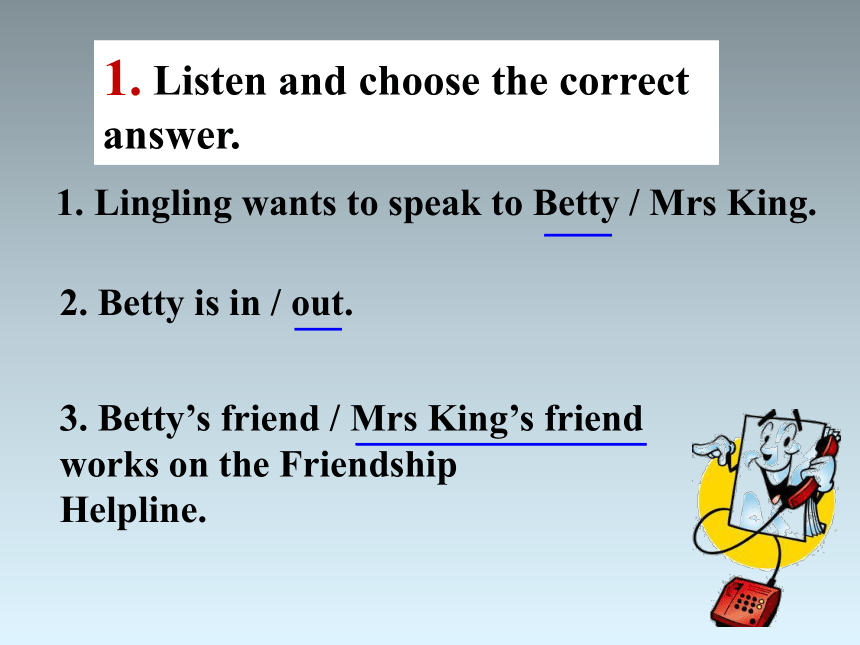
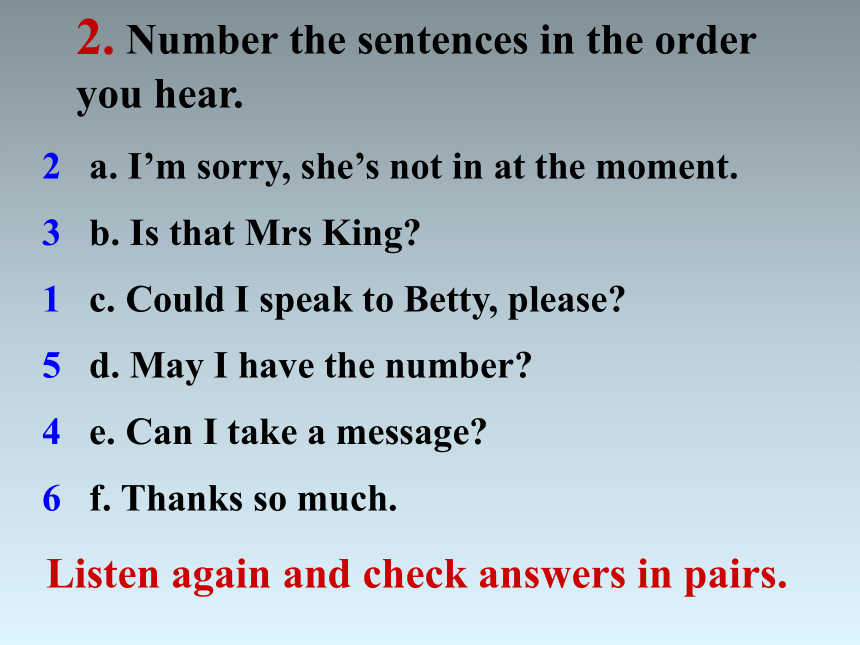

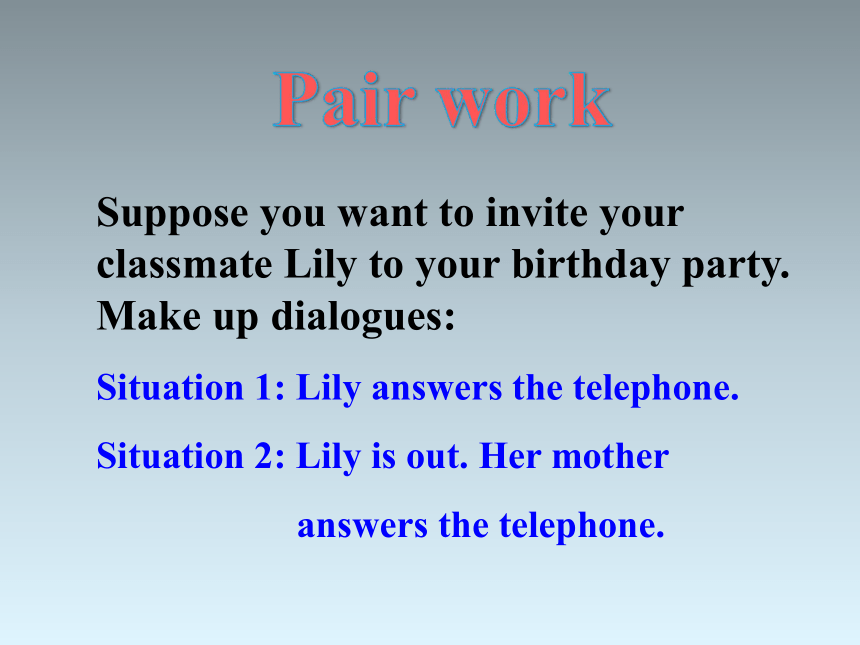
文档简介
(共92张PPT)
A friend in need is a friend indeed.
Do you agree
What do you think about a true friend
Do you have many friends
How long have you been friends
Do you talk about everything with
your best friend
Do you often make a telephone call with your friend
Do you have any problems with him/her
What will you do if you have a problem with your best friend
2. Betty is in / out.
1. Lingling wants to speak to Betty / Mrs King.
1. Listen and choose the correct answer.
3. Betty’s friend / Mrs King’s friend works on the Friendship Helpline.
a. I’m sorry, she’s not in at the moment.
b. Is that Mrs King
c. Could I speak to Betty, please
d. May I have the number
e. Can I take a message
f. Thanks so much.
2. Number the sentences in the order you hear.
2
3
1
5
4
6
Listen again and check answers in pairs.
Making telephone calls
Is Chen Huan there
Is that Chen Huan speaking
… 在吗?
你是…吗?
This is Sally Maxwell speaking.
我是…
Who is calling, please
你是谁?
Hold the line, please.
Sorry. He isn’t here right now / at the moment.
Can I take a message
I’ll call back later.
请别挂断电话。
很抱歉,他此刻不在。
我能带个信吗?
我稍后会再打来。
Suppose you want to invite your classmate Lily to your birthday party. Make up dialogues:
Situation 1: Lily answers the telephone.
Situation 2: Lily is out. Her mother
answers the telephone.
Complete the conversation.
— Hello, can I _____ you
— Yes . ___________ I speak to Alice, please
— May I ask who’s ______
— This is Jane Black.
— ______ the line, please, Ms Black.
___________, Alice is at a meeting right now.
Can I _____ a message
— Yes, please. Could you tell her that I’ll be free
tomorrow
— Sure. Bye.
— Bye.
help
Can / May
calling
Hold
I’m sorry
take
1. Lingling called to ask for advice about her schoolwork. ( )
2. Lingling and her best friend are now in the same school. ( )
3. Lingling is happy to see her best friend at the same school. ( )
4. Lingling is having a hard time in the new school. ( )
5. Lingling gets help from the helpline. ( )
√
√
3. Now check (√) the true sentences.
√
Read and answer the questions.
1. Why does Lingling call Friendship Helpline
2. What’s the problem
Because she has a problem with her best friend. She wants to get help.
Lingling’s best friend doesn’t like her to see her other friends.
3. What’s the reason for the problem that the Friendship Helpline thinks
Friendship Helpline thinks maybe her best friend doesn’t feel very sure of herself in her new school.
4. What advice does the Friendship Helpline gives
Try to find out whether she feels lonely without you. Be patient with her and explain to her that she can make friends with your other friends too. Try to introduce her to them.
Read the conversation and complete the passage.
Lingling has a _________with her best friend. She wants to get ______ from the Friendship Helpline. They’ve been friends for five years. They got _________ when they went to different schools last term. This term, her best friend came to her school. But Lingling found her best friend was _________. She may not want Lingling to see other friends.
problem
help
separated
different
The Friendship Helpline thinks maybe her friend feels ______. She probably _______ Lingling like that because she does not feel sure of herself. She probably _______ hurting Lingling. The Friendship Helpline suggests Lingling should be _______ with her, __________ her to Lingling’s other friends and ___________ her to join in more.
lonely
treats
regrets
patient
introduce
encourage
Work in pairs. Read the conversation and make a new one according to this conversation. Then, practice the conversation with your partners.
4. Complete the passage with the correct form of the words in the box.
When you get _________ from a friend, it may create problems for your friendship. She may not want you to see your other friends. If this is the case, she probably _________ you like that because she does not feel sure of ___________.
encourage herself introduce lonely patient regret separate treat
separated
treats
herself
Try to find out whether she feels ___________ without you. It is natural to feel like that. She probably _________ hurting you. Be _________ with her, __________ her to your other friends and __________ her to join in more.
encourage herself introduce lonely patient regret separate treat
lonely
regrets
patient
encourage
introduce
Read and make a dialogue with
each one.
Who’s calling, please
This is … speaking.
A: Hello, this is Doctor. Li on the
helpline. Who’s calling, please
B: Hello. This is Tom speaking.
5. Listen and underline the words the speaker stresses.
1. Don’t tell me who she is.
2. Tell me when the problem started.
3. Can you tell me how she’s different
4. Maybe she doesn’t feel very sure of herself in her new school
5. I’ll encourage her to join in more
6. Work in pairs. Talk about your problems with friendship.
Student A: You call the helpline to ask for advice on your problems.
I’m shy and I haven’t had many friends.
I had a big fight with my best friend and we don’t talk to each other now.
I have to go to a new school, but I don’t want to leave my friends.
Student B: You work on the helpline. Listen to Student A’s problems and try to help.
This is … on the helpline. How can I help you
This is … speaking.
I have a problem…
I’m shy and I haven’t had many friends.
I had a big fight with my best friend and we don’t talk to each other now.
I have to go to a new school, but I don’t want to leave my friends.
My parents ask me to attend a summer course but I don’t want to. I want to play with my friends.
Suppose you are in a strange place, no one knows who you are. What will you do to make you feel less lonely
1. We got separated when we went to different schools last term, but we stayed in touch.
(1) separate v. 使分开;分离;隔开
Separate the bad apples from the good ones.
把坏苹果和好的分开。
England is separated from France by the Channel.
英吉利海峡把英国和法国分隔开。
separate adj. 独自的,独立的,各自的,分离的,分开的。如:
My little son wants a separate room.
我小儿子想要个单间。
I want to listen to your separate opinions.
我想听你们每个人自己的看法。
separate & divide
separate指把两个人或物分开,着重从原属一个整体中移居一部分或把两者隔开。常用词组有be separated from“从…中分离…”,be separated by“由…所分开/分离” 。
The two countries are separated by a river.
这两个国家被一条河分开。
This patient should be separated from the others.
这个病人应该隔离。
辨析
divide指把一个整体按要求分成几个部分,暗示分配之意;也可指分开两个对立的事物。常用的词组有divide sth. into,把…划分成…。
A year is divided into four seasons.
一年分为四个季节。
Why is the government divided into three branches
为什么政府分为三大部门?
Mother ________ the cake into four.
妈妈把这块蛋糕分成了四份。
The river __________ this village from that one.
这条河把这个村庄和那个村庄分开了。
divided
separates
We should divide all the potatoes _____ two piles and separated the good ones _____ the bad ones.
A. from; by B. into; from
C. into; into D. from; into
B
The students in the class were _____ four groups before they stared the game A. divided into
B. separated into
C. divided from
D. separated into
A
(2) stay in touch = keep in touch 保持联系
Don’t forget to stay/keep in touch.
别忘了保持联系。
Now we stay in touch with friends and family by phone.
现在我们靠打电话和亲友保持联络。
2. So could you explain what happened then
explain v. 解释,说明
Can you explain why you were late
你能解释一下你为什么迟到吗?
He explained his plan in detail.
他仔细地说明了自己的计划。
The lawyer explained the new law to us.
律师向我们解释了新法律。
“向某人说明某事”不用explain sb. sth. 结构,可用explain (sth.) to sb. 表示。
注意
It’s a such difficult sentence that I had to explain ____. A. the students it B. it to the students
C. to the students it D. it the students
B
介词引出间接宾语,除了explain,还有 introduce,borrow。
explain sth. to sb. 向某人解释某事
introduce A to B 把A介绍给B
borrow sth. from sb. 向某人借某物
如果这个sth.较长(比如带个定语或本身就是一个名词性从句),为了句子的平衡,可将其后置成为:explain to sb. sth. (+定语),或explain to sb. that-从句。
Allow me to introduce a friend to you.
让我给你介绍一个朋友。
Could I borrow the bike from you until next week
我借用你的自行车,直到下周还你,好吗?
You should explain this to him.
你应该向他解释这事。
Explain to her the slight difference between two words.
向她解释这两个词的细微差别。
(1) if意思是“是否”,可以用于引导宾语从句,在口语中可与whether换用。
I don’t know whether / if you like swimming.
我不知道你是否喜欢游泳。
If he were here I can explain to him myself.
要是他在这里,我就可以亲自向他解释了。
3. Could I ask if you’ve mentioned this to her
另if可以用于引导条件状语从句,表示“如果”。从句用一般现在时,主句用一般将来时。如:
I will go to the park if it’s sunny tomorrow.
如果明天天晴我就去公园。
If they need technology, they buy it from abroad.
如果他们需要技术,他们就从国外买。
(2) mention v. 提及,谈到
Did you mention this to the boss
你跟老板提到这事没有?
Don’t mention my name or you’ll get me into trouble.
别提我的名字,免得给我惹麻烦。
He mentions hearing from her often.
他提到经常有她的信儿。
mention sth. to sb. 向某人说起某事物
Did she mention it to the police
她向警察提过吗?
He felt it his duty to mention this fact to them.
他感到有责任向他们提及这一情况。
注意:mention只有及物动词的用法,后面不可以接介词。
My father often ______ the importance of study to me.
A. mention B. mentions
C. mentioned D. mentioning
B
4. Yes, but she refused to listen.
refuse v. 拒绝
They refused him admittance.
他们不允许他入场。
We were refused permission to enter.
我们被拒之门外。
We asked him to come, but he refused.
我们叫他来, 可是他拒绝了。
He refused to come to the meeting.
他拒绝来参加会议。
I refuse to answer that question.
我不愿回答那个问题。
The door refuses to open.
这门打不开。
refuse to do sth. 拒绝做某事
Don’t refuse ______ to the new song, it’s so wonderful.
A. to listen B. listen
C. listening
A
★要求跟不定式的动词
want, wish, hope, expect, intend, mean, agree,
promise, care, hate, determine, decide, offer,
attempt, try, manage等。
★接不定式作宾补的常用动词
advise, allow, ask, encourage, expect, force,
intend, invite, order, persuade, prefer,
remind, teach, tell, warn, wish等。
David said that the glass was broken and warned me __________ it. (2016江苏徐州)
A. don’t touch B. to not touch
C. not to touch D. no touching
C
Live or not, a famous American actor, was always expecting ______ an Oscar and finally he made it. (2016广东)
A. to win B. will win
C. not to win D. not winning
A
Mr. Smith told his son _____ the football match because of the exam.
A. not to watch
B. to not watch
C. not watching
D. doesn’t watch
A
Harry has decided _______ an online shop after graduating from school. (2014上海)
A. open B. to open
C. opened D. opening
B
Lucy is shy. She would not invite her classmates _____ dancing with her. (2013江西)
practice B. practices
C. practicing D. to practice
【答案】D
【解析】 考查非谓语动词的用法,invite的用法是 invite sb. to do sth. 故选 to practice。
— What are you going to do when you grow up
— A singer, but my parents wish me ____ a teacher. (2013江苏扬州)
A. am B. to be
C. will be D. be
【解析】考查wish sb. to do的用法。根据句意“你长大后将要做什么?”“歌手,但我的父母希望我成为一个老师。”及句中wish确定要用固定结构wish sb. to do sth.“希望某人做某事”,所以选择答案B。
5. Do you know why she treats you like that
treat sb. like that 向那样对待某人
He treated me like that when I was in trouble.
当我遇到麻烦时,他那样对我。
Look here, do you think you can treat me like a schoolboy
听着!你以为可以像对待一个小学生那样来对待我吗?
6. Maybe she doesn’t feel very sure of herself in her new school.
feel/be sure of oneself 有自信心,满怀信心
To succeed in something, you must be sure of yourself.
要想获得成功,你必须有自信心。
Joan will sit for an important examination next week, but she is not sure of herself.
琼下周要参加一个重要考试,但她对自己没有十分把握。
More expressions:
absent oneself 缺席
beside oneself 失常;若狂
of oneself 独自;自发地
in spite of oneself 不知不觉地
be oneself 身心自在,怡然自得
be pleased with oneself 自满
come to oneself 苏醒过来;醒悟过来
for oneself 为自己;代表自己;独力地
拓展
7. Try to find out whether she feels lonely without you.
feel lonely 感到孤独
She lives alone and often feels lonely.
她独自一人生活,常感到寂寞。
It is normal to feel lonely sometimes.
偶尔会觉得寂寞是很正常的。
alone adj. 单独的;独自的
She watches TV when she is alone. 独自一人时,她便看电视。
Attention !
alone是表语形容词,能说The man is alone,但是不能说an alone man,也不能说very alone。
拓展
辨析
lonely & alone
lonely和alone都可做表语,但lonely还可做定语,alone不能。lonely强调精神上的孤单,而alone强调形体上的孤单。
He stayed at home alone but he was not lonely.
他一个人在家待着,但是他不孤独。
Kate’s family moved to a new place. She
often stays _____ at home and sometimes she feels ______ without friends now.
A. alone; alone B. alone ; lonely
C. lonely; lonely D. lonely: alone
B
8. I’m sure she regrets hurting you.
regret v. 遗憾,后悔
(1) regret doing sth. 后悔做了某事(表示对已经发生的事情感到后悔)。
I regret taking his advice at that time.
我后悔当初接受了他的建议。
(2) regret + n. / pron.
She immediately regretted her decision.
她立即后悔了她的决定。
I regret the loss of her friendship.
我为失去她的友谊而遗憾。
(3) regret + that / wh-clause
I deeply regret what I said.
我非常后悔说了那些话。
I regret that I am unable to accept your kind invitation.
很遗憾,我不能接受你的友好邀请。
(4) regret + to do
We regret to inform you that your application has not been successful.
我们很遗憾的通知你,你的申请未通过。
I regret to say you failed in the exam.
我遗憾地说你考试不及格。
( ) 1. —You were brave enough to raise objections at the meeting.
— Well, now I regret ______ that.
A. to do B. to be doing
C. to have done D. having done
( ) 2. He regretted ______ his father yesterday.
A. having not seen B. seeing not
C. not to see D. not seeing
D
D
( ) 3. I regret ______ that we have no news for you.
A. to say B. saying
C. to have said D. having said
A
(1) be patient with 对……有耐心
Ms. Wang is always patient with her students.
王老师对她的学生总是很有耐心。
He is just a small child, so you must be patient with him.
他只不过是个小孩子,你应该对他耐心点。
9. So be patient with her and explain to her
that she can make friends with your other
friends too.
(2) make friends with sb. 与某人交朋友
I am glad to make friends with you.
我很高兴能和你交朋友。
I will not make friends with a dishonest person.
我决不会与不诚实的人交朋友。
introduce … to sb. 向某人介绍…
introduce oneself to 自我介绍
Let me introduce my friend to you.
让我向你介绍我的朋友。
Let me introduce myself to you.
让我向您做个自我介绍。
10. Try to introduce her to them.
(1) Encourage sb. to do 鼓励某人做某事
Miss Zhang encourages us to try again.
张老师鼓励我们再试一试。
How do you encourage yourself
你是怎样鼓励自己的?
11. I’ll encourage her to join in more.
My mother often encourages me
_______ English as much as possible.
A. speak B. speaks
C. speaking D. to speak
English teachers often encourage the students _______ English aloud.
A. read B. reading
C. to read D. readed
(2) join vi. 加入(团体,组织,参军)、同…一起做/玩;连接
I joined the Party in 1975.
我1975年入党。
His brother joined the army two years ago.
两年前他哥哥参军。
They are planning to join the two towns by a railway.
他们在计划用一条铁路把两个镇连接起来。
知识链接
join in 参加(某些活动,如“球赛、游戏”等,常用于日常口语)。如:
May I join in your discussion
我可以参加你们的讨论吗?
Many people join in the game every year.
每年许多人参加这个游戏活动。
He joined in the work without a second thought.
他未加思索地参加了那项工作。
辨析
join指加入某党派、某组织或某社会团体,以及参军等,还可表示参与某种活动。
I will never forget the day when I joined the Party.
我永远也忘不了入党的那一天。
Will you join us for dinner
请你和我们一起吃饭好吗?
join & join in
join in通常指参加某种活动,尤其指和其他人一起参加某项活动。
May I join in the game
我可以参加这个比赛吗?
I hope you’ll all join in the discussion.
我希望你们大家都参加讨论。
如果说“与某人一起做某事”、“和…在一起”则用join sb. in sth. / doing sth.。
Would you join me in a walk
和我一起去散步好吗?
Will you join us in a game of cards
你愿意和我们一起玩牌吗?
Will you _______ us for lunch
Do you mind if I _______ you
When do you want to _______ us
She listens but she never ______ singing.
join
join
join
joins in
( ) -Jenny, I hear there will be an art club in our school. -Wonderful! I can’t wait to _____ it.
A. repeat
B. forget
C. receive
D. join
D
1. I don’t know w______ you like the flowers or not.
2. Jack and Lily are ____________ (同学). They often go to school together.
3. I don’t want someone to ask about my __________ (私人的) information.
hether
classmates
personal
Ⅰ.完成句子。
4. During the Spring Festival my parents and I visit our _________, for example, my cousins.
5. In China most children go to ________ primary schools instead of private ones.
6. There are a few ___________ (外国人) in the university.
relations
public
foreigners
Ⅱ. 用所给单词的适当形式填空
1. Do you know if Sally Maxwell has _______ (arrive)
2. I’m going to ask you some personal _________ (question).
3. I’ve _______ ( hear ) that you play in your school orchestra.
4. Our last public concert will be here on Starsearch in a couple of ________ (month).
5. I asked your secretary if she ________ ( can ) come.
arrived
questions
heard
months
could
When he comes here. I’ll ________ (解释)
to him myself.
2. What an awful way to ______ (对待) a friend like this!
3. He expects me to stay on here and I can hardly _______ (拒绝 ).
4. My father is a _________ (耐心的) man.
5. We’ll go around the room, and each of you can __________ (介绍) yourself.
Ⅲ. 根据句意和汉语提示写单词。
explain
treat
refuse
patient
introduce
Ⅳ. 单项选择
( )1. Can I _______ a message
A. take B. bring C. carry D. give
( )2. I don’t know who _______.
A. will come B. come
C. comes D. coming
( )3. I asked your secretary ______ she could come.
A. that B. / C. what D. if
A
A
D
( )4. Can you tell ______
A. where are you from
B. where you are from
C. where do you come from
D. where do you come
( )5. I have some ______ friends here.
A. closed B. close
C. near D. nearly
B
B
( )6. —Who’s calling, please
— ______ Lingling speaking.
A. I am B. She is
C. This is D. That is
( )7. ______ your help, I can’t make so
much progress.
A. With B. Under C. Below D. Without
C
D
A friend in need is a friend indeed.
Do you agree
What do you think about a true friend
Do you have many friends
How long have you been friends
Do you talk about everything with
your best friend
Do you often make a telephone call with your friend
Do you have any problems with him/her
What will you do if you have a problem with your best friend
2. Betty is in / out.
1. Lingling wants to speak to Betty / Mrs King.
1. Listen and choose the correct answer.
3. Betty’s friend / Mrs King’s friend works on the Friendship Helpline.
a. I’m sorry, she’s not in at the moment.
b. Is that Mrs King
c. Could I speak to Betty, please
d. May I have the number
e. Can I take a message
f. Thanks so much.
2. Number the sentences in the order you hear.
2
3
1
5
4
6
Listen again and check answers in pairs.
Making telephone calls
Is Chen Huan there
Is that Chen Huan speaking
… 在吗?
你是…吗?
This is Sally Maxwell speaking.
我是…
Who is calling, please
你是谁?
Hold the line, please.
Sorry. He isn’t here right now / at the moment.
Can I take a message
I’ll call back later.
请别挂断电话。
很抱歉,他此刻不在。
我能带个信吗?
我稍后会再打来。
Suppose you want to invite your classmate Lily to your birthday party. Make up dialogues:
Situation 1: Lily answers the telephone.
Situation 2: Lily is out. Her mother
answers the telephone.
Complete the conversation.
— Hello, can I _____ you
— Yes . ___________ I speak to Alice, please
— May I ask who’s ______
— This is Jane Black.
— ______ the line, please, Ms Black.
___________, Alice is at a meeting right now.
Can I _____ a message
— Yes, please. Could you tell her that I’ll be free
tomorrow
— Sure. Bye.
— Bye.
help
Can / May
calling
Hold
I’m sorry
take
1. Lingling called to ask for advice about her schoolwork. ( )
2. Lingling and her best friend are now in the same school. ( )
3. Lingling is happy to see her best friend at the same school. ( )
4. Lingling is having a hard time in the new school. ( )
5. Lingling gets help from the helpline. ( )
√
√
3. Now check (√) the true sentences.
√
Read and answer the questions.
1. Why does Lingling call Friendship Helpline
2. What’s the problem
Because she has a problem with her best friend. She wants to get help.
Lingling’s best friend doesn’t like her to see her other friends.
3. What’s the reason for the problem that the Friendship Helpline thinks
Friendship Helpline thinks maybe her best friend doesn’t feel very sure of herself in her new school.
4. What advice does the Friendship Helpline gives
Try to find out whether she feels lonely without you. Be patient with her and explain to her that she can make friends with your other friends too. Try to introduce her to them.
Read the conversation and complete the passage.
Lingling has a _________with her best friend. She wants to get ______ from the Friendship Helpline. They’ve been friends for five years. They got _________ when they went to different schools last term. This term, her best friend came to her school. But Lingling found her best friend was _________. She may not want Lingling to see other friends.
problem
help
separated
different
The Friendship Helpline thinks maybe her friend feels ______. She probably _______ Lingling like that because she does not feel sure of herself. She probably _______ hurting Lingling. The Friendship Helpline suggests Lingling should be _______ with her, __________ her to Lingling’s other friends and ___________ her to join in more.
lonely
treats
regrets
patient
introduce
encourage
Work in pairs. Read the conversation and make a new one according to this conversation. Then, practice the conversation with your partners.
4. Complete the passage with the correct form of the words in the box.
When you get _________ from a friend, it may create problems for your friendship. She may not want you to see your other friends. If this is the case, she probably _________ you like that because she does not feel sure of ___________.
encourage herself introduce lonely patient regret separate treat
separated
treats
herself
Try to find out whether she feels ___________ without you. It is natural to feel like that. She probably _________ hurting you. Be _________ with her, __________ her to your other friends and __________ her to join in more.
encourage herself introduce lonely patient regret separate treat
lonely
regrets
patient
encourage
introduce
Read and make a dialogue with
each one.
Who’s calling, please
This is … speaking.
A: Hello, this is Doctor. Li on the
helpline. Who’s calling, please
B: Hello. This is Tom speaking.
5. Listen and underline the words the speaker stresses.
1. Don’t tell me who she is.
2. Tell me when the problem started.
3. Can you tell me how she’s different
4. Maybe she doesn’t feel very sure of herself in her new school
5. I’ll encourage her to join in more
6. Work in pairs. Talk about your problems with friendship.
Student A: You call the helpline to ask for advice on your problems.
I’m shy and I haven’t had many friends.
I had a big fight with my best friend and we don’t talk to each other now.
I have to go to a new school, but I don’t want to leave my friends.
Student B: You work on the helpline. Listen to Student A’s problems and try to help.
This is … on the helpline. How can I help you
This is … speaking.
I have a problem…
I’m shy and I haven’t had many friends.
I had a big fight with my best friend and we don’t talk to each other now.
I have to go to a new school, but I don’t want to leave my friends.
My parents ask me to attend a summer course but I don’t want to. I want to play with my friends.
Suppose you are in a strange place, no one knows who you are. What will you do to make you feel less lonely
1. We got separated when we went to different schools last term, but we stayed in touch.
(1) separate v. 使分开;分离;隔开
Separate the bad apples from the good ones.
把坏苹果和好的分开。
England is separated from France by the Channel.
英吉利海峡把英国和法国分隔开。
separate adj. 独自的,独立的,各自的,分离的,分开的。如:
My little son wants a separate room.
我小儿子想要个单间。
I want to listen to your separate opinions.
我想听你们每个人自己的看法。
separate & divide
separate指把两个人或物分开,着重从原属一个整体中移居一部分或把两者隔开。常用词组有be separated from“从…中分离…”,be separated by“由…所分开/分离” 。
The two countries are separated by a river.
这两个国家被一条河分开。
This patient should be separated from the others.
这个病人应该隔离。
辨析
divide指把一个整体按要求分成几个部分,暗示分配之意;也可指分开两个对立的事物。常用的词组有divide sth. into,把…划分成…。
A year is divided into four seasons.
一年分为四个季节。
Why is the government divided into three branches
为什么政府分为三大部门?
Mother ________ the cake into four.
妈妈把这块蛋糕分成了四份。
The river __________ this village from that one.
这条河把这个村庄和那个村庄分开了。
divided
separates
We should divide all the potatoes _____ two piles and separated the good ones _____ the bad ones.
A. from; by B. into; from
C. into; into D. from; into
B
The students in the class were _____ four groups before they stared the game A. divided into
B. separated into
C. divided from
D. separated into
A
(2) stay in touch = keep in touch 保持联系
Don’t forget to stay/keep in touch.
别忘了保持联系。
Now we stay in touch with friends and family by phone.
现在我们靠打电话和亲友保持联络。
2. So could you explain what happened then
explain v. 解释,说明
Can you explain why you were late
你能解释一下你为什么迟到吗?
He explained his plan in detail.
他仔细地说明了自己的计划。
The lawyer explained the new law to us.
律师向我们解释了新法律。
“向某人说明某事”不用explain sb. sth. 结构,可用explain (sth.) to sb. 表示。
注意
It’s a such difficult sentence that I had to explain ____. A. the students it B. it to the students
C. to the students it D. it the students
B
介词引出间接宾语,除了explain,还有 introduce,borrow。
explain sth. to sb. 向某人解释某事
introduce A to B 把A介绍给B
borrow sth. from sb. 向某人借某物
如果这个sth.较长(比如带个定语或本身就是一个名词性从句),为了句子的平衡,可将其后置成为:explain to sb. sth. (+定语),或explain to sb. that-从句。
Allow me to introduce a friend to you.
让我给你介绍一个朋友。
Could I borrow the bike from you until next week
我借用你的自行车,直到下周还你,好吗?
You should explain this to him.
你应该向他解释这事。
Explain to her the slight difference between two words.
向她解释这两个词的细微差别。
(1) if意思是“是否”,可以用于引导宾语从句,在口语中可与whether换用。
I don’t know whether / if you like swimming.
我不知道你是否喜欢游泳。
If he were here I can explain to him myself.
要是他在这里,我就可以亲自向他解释了。
3. Could I ask if you’ve mentioned this to her
另if可以用于引导条件状语从句,表示“如果”。从句用一般现在时,主句用一般将来时。如:
I will go to the park if it’s sunny tomorrow.
如果明天天晴我就去公园。
If they need technology, they buy it from abroad.
如果他们需要技术,他们就从国外买。
(2) mention v. 提及,谈到
Did you mention this to the boss
你跟老板提到这事没有?
Don’t mention my name or you’ll get me into trouble.
别提我的名字,免得给我惹麻烦。
He mentions hearing from her often.
他提到经常有她的信儿。
mention sth. to sb. 向某人说起某事物
Did she mention it to the police
她向警察提过吗?
He felt it his duty to mention this fact to them.
他感到有责任向他们提及这一情况。
注意:mention只有及物动词的用法,后面不可以接介词。
My father often ______ the importance of study to me.
A. mention B. mentions
C. mentioned D. mentioning
B
4. Yes, but she refused to listen.
refuse v. 拒绝
They refused him admittance.
他们不允许他入场。
We were refused permission to enter.
我们被拒之门外。
We asked him to come, but he refused.
我们叫他来, 可是他拒绝了。
He refused to come to the meeting.
他拒绝来参加会议。
I refuse to answer that question.
我不愿回答那个问题。
The door refuses to open.
这门打不开。
refuse to do sth. 拒绝做某事
Don’t refuse ______ to the new song, it’s so wonderful.
A. to listen B. listen
C. listening
A
★要求跟不定式的动词
want, wish, hope, expect, intend, mean, agree,
promise, care, hate, determine, decide, offer,
attempt, try, manage等。
★接不定式作宾补的常用动词
advise, allow, ask, encourage, expect, force,
intend, invite, order, persuade, prefer,
remind, teach, tell, warn, wish等。
David said that the glass was broken and warned me __________ it. (2016江苏徐州)
A. don’t touch B. to not touch
C. not to touch D. no touching
C
Live or not, a famous American actor, was always expecting ______ an Oscar and finally he made it. (2016广东)
A. to win B. will win
C. not to win D. not winning
A
Mr. Smith told his son _____ the football match because of the exam.
A. not to watch
B. to not watch
C. not watching
D. doesn’t watch
A
Harry has decided _______ an online shop after graduating from school. (2014上海)
A. open B. to open
C. opened D. opening
B
Lucy is shy. She would not invite her classmates _____ dancing with her. (2013江西)
practice B. practices
C. practicing D. to practice
【答案】D
【解析】 考查非谓语动词的用法,invite的用法是 invite sb. to do sth. 故选 to practice。
— What are you going to do when you grow up
— A singer, but my parents wish me ____ a teacher. (2013江苏扬州)
A. am B. to be
C. will be D. be
【解析】考查wish sb. to do的用法。根据句意“你长大后将要做什么?”“歌手,但我的父母希望我成为一个老师。”及句中wish确定要用固定结构wish sb. to do sth.“希望某人做某事”,所以选择答案B。
5. Do you know why she treats you like that
treat sb. like that 向那样对待某人
He treated me like that when I was in trouble.
当我遇到麻烦时,他那样对我。
Look here, do you think you can treat me like a schoolboy
听着!你以为可以像对待一个小学生那样来对待我吗?
6. Maybe she doesn’t feel very sure of herself in her new school.
feel/be sure of oneself 有自信心,满怀信心
To succeed in something, you must be sure of yourself.
要想获得成功,你必须有自信心。
Joan will sit for an important examination next week, but she is not sure of herself.
琼下周要参加一个重要考试,但她对自己没有十分把握。
More expressions:
absent oneself 缺席
beside oneself 失常;若狂
of oneself 独自;自发地
in spite of oneself 不知不觉地
be oneself 身心自在,怡然自得
be pleased with oneself 自满
come to oneself 苏醒过来;醒悟过来
for oneself 为自己;代表自己;独力地
拓展
7. Try to find out whether she feels lonely without you.
feel lonely 感到孤独
She lives alone and often feels lonely.
她独自一人生活,常感到寂寞。
It is normal to feel lonely sometimes.
偶尔会觉得寂寞是很正常的。
alone adj. 单独的;独自的
She watches TV when she is alone. 独自一人时,她便看电视。
Attention !
alone是表语形容词,能说The man is alone,但是不能说an alone man,也不能说very alone。
拓展
辨析
lonely & alone
lonely和alone都可做表语,但lonely还可做定语,alone不能。lonely强调精神上的孤单,而alone强调形体上的孤单。
He stayed at home alone but he was not lonely.
他一个人在家待着,但是他不孤独。
Kate’s family moved to a new place. She
often stays _____ at home and sometimes she feels ______ without friends now.
A. alone; alone B. alone ; lonely
C. lonely; lonely D. lonely: alone
B
8. I’m sure she regrets hurting you.
regret v. 遗憾,后悔
(1) regret doing sth. 后悔做了某事(表示对已经发生的事情感到后悔)。
I regret taking his advice at that time.
我后悔当初接受了他的建议。
(2) regret + n. / pron.
She immediately regretted her decision.
她立即后悔了她的决定。
I regret the loss of her friendship.
我为失去她的友谊而遗憾。
(3) regret + that / wh-clause
I deeply regret what I said.
我非常后悔说了那些话。
I regret that I am unable to accept your kind invitation.
很遗憾,我不能接受你的友好邀请。
(4) regret + to do
We regret to inform you that your application has not been successful.
我们很遗憾的通知你,你的申请未通过。
I regret to say you failed in the exam.
我遗憾地说你考试不及格。
( ) 1. —You were brave enough to raise objections at the meeting.
— Well, now I regret ______ that.
A. to do B. to be doing
C. to have done D. having done
( ) 2. He regretted ______ his father yesterday.
A. having not seen B. seeing not
C. not to see D. not seeing
D
D
( ) 3. I regret ______ that we have no news for you.
A. to say B. saying
C. to have said D. having said
A
(1) be patient with 对……有耐心
Ms. Wang is always patient with her students.
王老师对她的学生总是很有耐心。
He is just a small child, so you must be patient with him.
他只不过是个小孩子,你应该对他耐心点。
9. So be patient with her and explain to her
that she can make friends with your other
friends too.
(2) make friends with sb. 与某人交朋友
I am glad to make friends with you.
我很高兴能和你交朋友。
I will not make friends with a dishonest person.
我决不会与不诚实的人交朋友。
introduce … to sb. 向某人介绍…
introduce oneself to 自我介绍
Let me introduce my friend to you.
让我向你介绍我的朋友。
Let me introduce myself to you.
让我向您做个自我介绍。
10. Try to introduce her to them.
(1) Encourage sb. to do 鼓励某人做某事
Miss Zhang encourages us to try again.
张老师鼓励我们再试一试。
How do you encourage yourself
你是怎样鼓励自己的?
11. I’ll encourage her to join in more.
My mother often encourages me
_______ English as much as possible.
A. speak B. speaks
C. speaking D. to speak
English teachers often encourage the students _______ English aloud.
A. read B. reading
C. to read D. readed
(2) join vi. 加入(团体,组织,参军)、同…一起做/玩;连接
I joined the Party in 1975.
我1975年入党。
His brother joined the army two years ago.
两年前他哥哥参军。
They are planning to join the two towns by a railway.
他们在计划用一条铁路把两个镇连接起来。
知识链接
join in 参加(某些活动,如“球赛、游戏”等,常用于日常口语)。如:
May I join in your discussion
我可以参加你们的讨论吗?
Many people join in the game every year.
每年许多人参加这个游戏活动。
He joined in the work without a second thought.
他未加思索地参加了那项工作。
辨析
join指加入某党派、某组织或某社会团体,以及参军等,还可表示参与某种活动。
I will never forget the day when I joined the Party.
我永远也忘不了入党的那一天。
Will you join us for dinner
请你和我们一起吃饭好吗?
join & join in
join in通常指参加某种活动,尤其指和其他人一起参加某项活动。
May I join in the game
我可以参加这个比赛吗?
I hope you’ll all join in the discussion.
我希望你们大家都参加讨论。
如果说“与某人一起做某事”、“和…在一起”则用join sb. in sth. / doing sth.。
Would you join me in a walk
和我一起去散步好吗?
Will you join us in a game of cards
你愿意和我们一起玩牌吗?
Will you _______ us for lunch
Do you mind if I _______ you
When do you want to _______ us
She listens but she never ______ singing.
join
join
join
joins in
( ) -Jenny, I hear there will be an art club in our school. -Wonderful! I can’t wait to _____ it.
A. repeat
B. forget
C. receive
D. join
D
1. I don’t know w______ you like the flowers or not.
2. Jack and Lily are ____________ (同学). They often go to school together.
3. I don’t want someone to ask about my __________ (私人的) information.
hether
classmates
personal
Ⅰ.完成句子。
4. During the Spring Festival my parents and I visit our _________, for example, my cousins.
5. In China most children go to ________ primary schools instead of private ones.
6. There are a few ___________ (外国人) in the university.
relations
public
foreigners
Ⅱ. 用所给单词的适当形式填空
1. Do you know if Sally Maxwell has _______ (arrive)
2. I’m going to ask you some personal _________ (question).
3. I’ve _______ ( hear ) that you play in your school orchestra.
4. Our last public concert will be here on Starsearch in a couple of ________ (month).
5. I asked your secretary if she ________ ( can ) come.
arrived
questions
heard
months
could
When he comes here. I’ll ________ (解释)
to him myself.
2. What an awful way to ______ (对待) a friend like this!
3. He expects me to stay on here and I can hardly _______ (拒绝 ).
4. My father is a _________ (耐心的) man.
5. We’ll go around the room, and each of you can __________ (介绍) yourself.
Ⅲ. 根据句意和汉语提示写单词。
explain
treat
refuse
patient
introduce
Ⅳ. 单项选择
( )1. Can I _______ a message
A. take B. bring C. carry D. give
( )2. I don’t know who _______.
A. will come B. come
C. comes D. coming
( )3. I asked your secretary ______ she could come.
A. that B. / C. what D. if
A
A
D
( )4. Can you tell ______
A. where are you from
B. where you are from
C. where do you come from
D. where do you come
( )5. I have some ______ friends here.
A. closed B. close
C. near D. nearly
B
B
( )6. —Who’s calling, please
— ______ Lingling speaking.
A. I am B. She is
C. This is D. That is
( )7. ______ your help, I can’t make so
much progress.
A. With B. Under C. Below D. Without
C
D
同课章节目录
- Module 1 Feelings and impressions
- Unit 1 It smells delicious.
- Unit 2 I feel nervous when I speak Chinese .
- Unit 3 Language in use
- Module 2 Experiences
- Unit 1 I've also entered lots of speaking competi
- Unit 2 They have seen the Pyramids.
- Unit 3 Language in use
- Module 3 Journey to space
- Unit 1 Has it arrived yet?
- Unit 2 We have not found life on any other planet
- Unit 3 Language in use
- Module 4 Seeing the docto
- Unit 1 I haven't done much exercise since I got m
- Unit 2 We have played football for a year now
- Unit 3 Language in use
- Module 5 Cartoons
- Unit 1 It's time to watch a cartoon.
- Unit 2 Tintin has been popular for over eighty yea
- Unit 3 Language in use
- Revision module A
- Module 6 Hobbies
- Unit 1 Do you collect anything ?
- Unit 2 Hobbies can make you grow as a person.
- Unit 3 Language in use
- Module 7 Summer in Los Angeles
- Unit 1 Please write to me and send me some photos
- Unit 2 Fill out a form and come to learn English
- Unit 3 Language in use
- Module 8 Time off
- Unit 1 I can hardly believe we are in the city ce
- Unit 2 We thought somebody was moving about
- Unit 3 Language in use
- Module 9 Friendship
- Unit 1 Could I ask if you've mentioned this to he
- Unit 2 I believe that the world is what you think
- Unit 3 Language in use
- Module 10 On the radio
- Unit 1 I hope that you can join us one day
- Unit 2 It seemed that they were speaking to me in
- Unit 3 Language in use
- Revision module B
